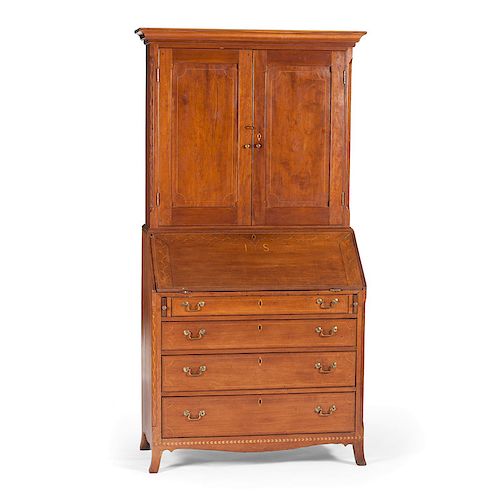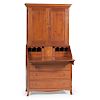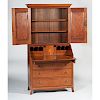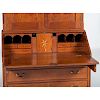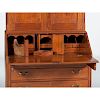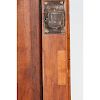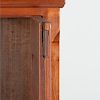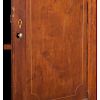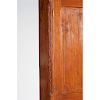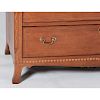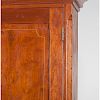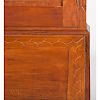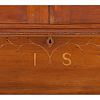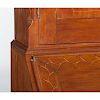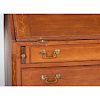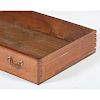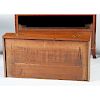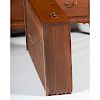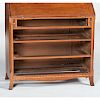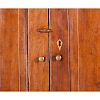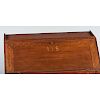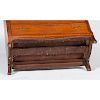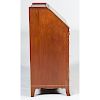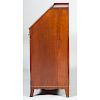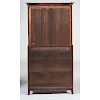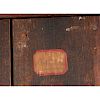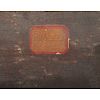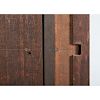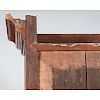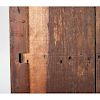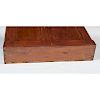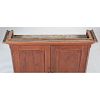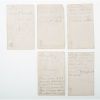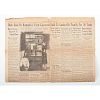Inlaid Kentucky Desk and Bookcase Purportedly Owned by Isaac Shelby
About Seller
6270 Este Ave.
Cincinnati , OH 45232
United States
With offices in Cincinnati, Cleveland and Denver, Cowan’s holds over 40 auctions each year, with annual sales exceeding $16M. We reach buyers around the globe, and take pride in our reputation for integrity, customer service and great results. A full-service house, Cowan’s Auctions specializes in Am...Read more
Two ways to bid:
- Leave a max absentee bid and the platform will bid on your behalf up to your maximum bid during the live auction.
- Bid live during the auction and your bids will be submitted real-time to the auctioneer.
Bid Increments
| Price | Bid Increment |
|---|---|
| $0 | $25 |
| $500 | $50 |
| $1,000 | $100 |
| $2,000 | $250 |
| $5,000 | $500 |
| $10,000 | $1,000 |
| $20,000 | $2,500 |
| $50,000 | $5,000 |
| $100,000 | $10,000 |
About Auction
Oct 6, 2018
The Americana, Including Fine and Decorative Art: Premier Auction features over 500 lots of fine art, furniture, silver, rugs, glass, Folk Art, timepieces, and advertising. Cowan's Auctions dawnie@cowans.com
- Lot Description
American (Kentucky), early 19th century. A two-piece secretary bookcase in cherry with walnut and poplar secondaries, the upper case having a molded cornice, canted corners decorated with vine and leaf inlay, over two paneled doors with banding inlay and interior shelving, the lower case having an inlay decorated slant front lid with central initials I. S. and vine and leaf floral perimeter, opening to a fitted desk interior consisting of a central star inlaid prospect door with tambour slide concealing secret drawers, six valanced pigeon holes over six fitted drawers with banding inlay, over four graduated banding inlay drawers and brass pulls, flanked by vine and leaf canted corners, chevron checkered inlaid apron with central motif rising on splayed French feet; ht. 83.5, wd. 41.25, dp. 20.5 in.
The Isaac Shelby Desk and Bookcase
This desk and bookcase have a long, and interesting history. Much of its provenance is documented in newspaper clippings and photographs from the 1920s and 1930s and in oral history passed along by the consignor and his ancestors. The desk has remained in the same Kentucky family since.
Virtually from the moment it was purchased at auction in Shelbyville, Kentucky sometime between 1886 and 1907, the piece has been known as the desk of Kentucky’s first, and fifth governor, Isaac Shelby (1750-1826).
While the shop in which this was made has not been identified, it probably belongs to a small group of furniture made in Boyle, Mercer, Lincoln and Casey counties of Kentucky which incorporate initials in conspicuous places. Kentucky scholar Mack Cox has so far identified two distinct shops that probably made this furniture, though the "IS desk is not a member of either, but as more examples crop up I expect to define more shop groups. The vine & dot inlay on the IS desk does occur in Kentucky and I do believe the desk is of Kentucky origins" (Personal Communication, January 3, 2018)
History of the Desk and Bookcase
From an historical standpoint, the first reference to the desk appears in an October 30, 1931 story published in the Louisville, Kentucky Herald Post. According to the article, the desk was purchased in Shelbyville, Kentucky by Malguoire L. DuBourg for a half dollar “at a sale of the effects of a Captain Johnson….some fifty years ago.” DuBourg was born in Louisville, and moved to Shelby County in 1886 working first as a farmer, and then later, as a florist. He returned to Louisville in 1907 where he died.
The dates of Dubourg’s residence in Shelbyville (1886-1907) provide a terminus a quo for the initial acquisition of the desk and bookcase, and the information that it was purchased from the “effects of a Captain Johnson” gives a starting point to understand the provenance of the desk.
An attempt to track down “Captain Johnson” has yielded tantalizing, but inconclusive evidence regarding the original owner of the desk. A search of military records of Union and Confederate Civil War veterans from Shelby County, found a single possible candidate for the elusive “Captain Johnson.”
James W. Johnson (1828-1913), served as Captain of Company E, 1st Kentucky Cavalry. His death and obituary was recorded in 1913 in The United Confederate, Vol XXII, pg. 136, with the following information: Johnson was a native of Shelby County, Kentucky, and lived for more than 80 years in that location. In 1907 he moved to Guthrie, Oklahoma to be nearer to his son. At his death, his body was returned to Shelbyville, where he is buried in Grove Hill Cemetery (his tombstone erroneously spells his last name “Johnston”).
Federal Census records show that Johnson lived virtually all of his life in Shelby County, married Elizabeth Jane Webb, and had three children. In 1910, the census records the 82 year old Johnson as living in Guthrie, Oklahoma. These same data make it clear, however, that Johnson was not a member of the Shelby County aristocracy, nor was his wife. At this point, Johnson may be the “Captain” who owned the desk when it was purchased by Dubourg. The date of Johnson’s departure from Shelbyville for Oklahoma -- 1907 -- squares with the 1931 Herald Post account of its purchase.
At Malguoire Dubourg’s death, the desk descended to his son, Achille W. Dubourg (1871-1923), and later Chief of Police of Shelbyville. At the death of A.W. in 1923, the desk came into the possession of his son, Achille D. Dubourg.
In October, 1926 Achille D. Dubourg apparently had photographs taken of the desk and sent them along with a letter of inquiry to the automaker and collector Henry Ford of Dearborn, Michigan. On November 1, Ford’s assistant H.R. Wadell inquired about a price, but it is clear a purchase never took place. In 1931 the desk was included in an Exhibition of Furniture from American Homes, 1790-1860 at the J.B. Speed Memorial Museum in Louisville, as number 46 “Cherry Inlaid Slant-top secretary originally made for Isaac Shelby, first Governor of Kentucky. Initials “I.S.” inlaid on top. Mrs. Achille DuBourg is listed as the lender to the exhibit.
The series of five snapshot photographs of the desk taken at the time the desk was offered to Ford show the desk sitting on the sidewalk in front of the Dubourg home in Louisville. These photographs establish the original condition of the desk, and document the changes that have been made to it since the 1920s.
The photographs show the desk and an accompanying bookcase “in the black”, with a dark, possibly original finish. The striking inlay on the fall front, stiles, drawer fronts and skirt, as well as the desk interior show the same piece of furniture offered here. The inlaid initials“I. S.” are clearly seen.
These early photographs also reveal that the current bookcase is clearly not original. The images show a relatively unsophisticated recessed paneled bookcase resting atop the desk, with no inlay. In one of the photographs the bookcase has been removed, revealing a total lack of bed molding meant to secure the upper case. Based upon these photographs it is probable that the original desk was not meant to have a conforming upper case. At some point in its history, a bookcase was built to simply rest on the top surface of the desk.
According to the consignor, at some point in the 1960s or 70s, the desk was refinished in Nashville, Tennessee. Since there are no records to indicate who accomplished the job, it seems probable that the current inlaid upper case was made to match the desk, bed molding added to accommodate the top, the hinges of the fall front were reset, and two old surface-mounted sets of hinges were removed (these hinges are clearly visible in the photographs from the 20s) and various minor repairs were made to the desk.
Isaac Shelby’s Desk?
The veracity of the DuBourg family tradition, is neither easy to prove or dispute. Since its purchase by Dubourg, it has been known as the “Isaac Shelby desk” if for no other reason than the initials “I.S.” inlaid on the fall-front. This in itself is not sufficient to identify the desk as belonging to Shelby.
Isaac Shelby had eleven children and 65 grandchildren, and at his death in 1826, parts of his estate passed to his wife and progeny. While his will enumerates a number of specific gifts to various children and grandchildren, including his sword presented by the state of North Carolina for his service during the Revolutionary War, his Congressional medal, spyglass, various canes, and library, no specific mention is made of a desk. All household furniture was specifically left to his wife Susannah. Presumably at Shelby’s death, the desk passed to her.
Line of Descent in the Dubourg Family
Possibly, Captain William A. Johnson, Shelby County, Kentucky, probably purchased from him in 1907 when he left for Oklahoma.
Malguoire L. DuBourg (1850-1914), was born in Louisville, but moved to Shelbyville, Kentucky in 1886, working first as a farmer, and later as a florist. In 1907 he returned to Louisville where he died. DuBourg purchases the desk in Shelbyville, Kentucky sometime between 1886-1907 and takes it to his Louisville home.
Achille W. Dubourg (1871-1923) Chief of Police, Shelbyville, Kentucky
Achille D. Dubourg (1896-1951), son of A.W. Dubourg
Antoinette Dubourg Frank (1898-1979), daughter of A. D. Dubourg
Marguerite Augusta Dubourg (1902-1993), daughter of A.D. Dubourg, sister of Antoinette Dubourg Frank
Vincent A. Biagi (1919-1996) grandson of Achille Dubourg, nephew of Maguerite Dubourg
Thence by descent to the present owner.Repairs and restorations throughout. Missing lap mold to slant lid corner. Minor surface scratches and wear throughout. Top a 20th century replacement.Condition
- Shipping Info
-
Buyers are required to pay for all packing, shipping and insurance charges. Overseas duty charges are the responsibility of the successful Bidder. Be aware that for larger and/or valuable items, shipping charges can be substantial. - If there is no shipping amount on listed your invoice, you will need to make arrangements to pick up or ship your purchase through an alternative shipping company. Our shipping department can be contacted at 513.871.1670 (ext. 219) or email shipping@cowans.com. - Shipping charges include insurance for your order while in transit. If you have private insurance we will adjust your charge to include only packing and shipping. - Please allow 14 – 21 days after payment to package and ship your purchase as carefully as possible.
-
- Buyer's Premium



 EUR
EUR CAD
CAD AUD
AUD GBP
GBP MXN
MXN HKD
HKD CNY
CNY MYR
MYR SEK
SEK SGD
SGD CHF
CHF THB
THB